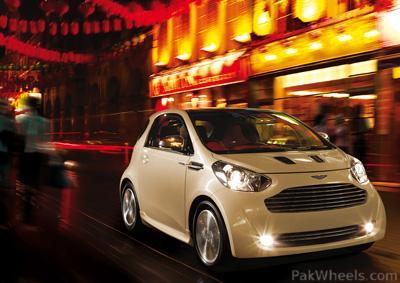ASTON CONFIRMS CYGNET PRODUCTION
Aston Martin has confirmed production of its Toyota-based Cygnet city car from 2011.
First shown as a concept in March 2010, the Cygnet is described as a modern city car based on sound Aston Martin principles but able to exploit tight parking spots, be frugal and emit low emissions.
For most Aston Martin owners it has been a design directive of pure heresy.
An unacceptable affront to everything Aston’s winged badge represents.
Environmental solution
Aston Martin CEO Dr Ulrich Bez believes there is a market for the car though. “Our customers need a small car for urban and city use, and they want the right tools for the right job, to downsize creatively without compromising intelligence, artistry and personality.”
“The Cygnet is designed to support our sports cars by providing a greater degree of freedom in the urban context; it is a very special car, a premium but compact package with heart, soul and personality.”
Just like any other Aston Martin, Cygnet comes with an almost limitless palette of materials and colours, too, and every car will be hand-built at the company’s Gaydon facility outside Warwickshire, England.
The Cygnet’s grille is classic Aston Martin, as are those rather pointless bonnet slits and side vents – which remind one distressingly of Aston’s DB9 and Vantage models.
Around the rump the Cygnet sports typical crescent-shaped Aston Martin taillights.
Marek Reichman, Aston Martin’s design director, said: "Cygnet is small but luxurious, an Aston Martin tailor fit for the city. Luxury is not constrained by scale," he added.
It may be small but expect it to carry the full Aston image inflation pricing values of its larger siblings. Initially only available to existing Aston owners.
Industry pundits wonder how Aston could possibly market the car beyond its existing customer network.
The issue is hardly that the donor vehicle platform, Toyota’s iQ, is in any way a terrible little car. Neatly styled and cleverly engineered it’s one the best Toyota’s in recent memory and an awfully compelling city-car transport solution. As an Aston Martin it is terrifically cheap in Cygnet guise. As a Toyota though, the probably asking price is ridiculous.
Slow because it has to be
Although Aston has promised to release further details and specification only later this year, don’t expect a radical departure from the series iQ’s running gear.
Mechanically the iQ is powered by a Toyota 1.3l engine, driving four-cylinders to peak outputs of 72kW and 123Nm.
The engine features dual VVT-i timing technology (on both inlet and exhaust camshafts) and stop-start functionality that ensures environmentally friendly emissions control (only 113g/km of carbon output), which is, as Aston have admitted, the Cygnet’s raison d'être.
Aston is hoping for sales of between 1000 and 2000 units when Cygnet becomes available to existing Aston Martin customers towards the end of next year.
We expect most owners would expect a Cygnet thrown in for free with their trade-in…
Ultimately though, as Aston is a standalone manufacturer, it needs a low emission vehicle to reduce its fleet emission footprint in anticipation of ever tightening EU emissions regulations.
What the Cygnet will do on a fundamental level (besides play havoc with Aston's brand awareness) is afford the company's engineers a window of opportunity to find replacement drivetrains (a combination of forced induction and hybrid for the larger V8 and V12 powered Aston Martin products, without sacrificing power.
